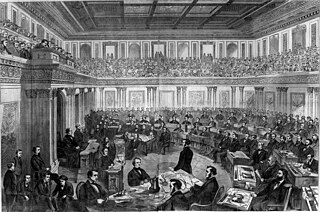
The United States National Security Council (NSC) is the national security council used by the president of the United States for consideration of national security, military, and foreign policy matters. Based in the White House, it is part of the Executive Office of the President of the United States, and composed of senior national security advisors and Cabinet officials.

In the United States, impeachment is the process by which a legislature may bring charges against an officeholder for misconduct alleged to have been committed with a penalty of removal. Impeachment may also occur at the state level if the state or commonwealth has provisions for it under its constitution. Impeachment might also occur with tribal governments as well as at the local level of government.
Barack Obama, a Democrat from Illinois, was elected president of the United States on November 4, 2008 and was inaugurated as the nation's 44th president on January 20, 2009. He was re-elected on November 6, 2012; his second inauguration was on January 20, 2013, and his presidency ended on January 20, 2017, with the inauguration of Donald Trump. The following articles cover the timeline of Obama's presidency, and the time leading up to it:

Norman L. Eisen is an American attorney, author, and former diplomat. He is a senior fellow in governance studies at the Brookings Institution, a CNN legal analyst, and the co-founder of the States United Democracy Center. He was co-counsel for the House Judiciary Committee during the first impeachment and trial of President Donald Trump in 2020. He served as White House Special Counsel for Ethics and Government Reform, United States Ambassador to the Czech Republic, and board chair of Citizens for Responsibility and Ethics in Washington (CREW). He is the author of four books, including The Last Palace: Europe's Turbulent Century in Five Lives and One Legendary House (2018). In 2022, he co-authored Overcoming Trumpery: How to Restore Ethics, the Rule of Law, and Democracy.
Donald Trump is the 45th and 47th president of the United States.

Trump is a surname of English and German origin:
High schools in North America are schools for secondary education, which may also involve intermediate education.
There have been four presidential campaigns waged by Donald Trump, the 45th and 47th president of the United States. He ran for president once for the Reform Party (2000), and three times as a Republican. He has additionally mused about running on several other occasions.

Donald Trump, the 45th president of the United States, addressed a joint session of the United States Congress on February 28, 2017. It was his first public address before a joint session. Similar to a State of the Union Address, it was delivered before the 115th United States Congress in the Chamber of the House of Representatives in the United States Capitol. Presiding over this joint session was the House speaker, Paul Ryan, accompanied by Mike Pence, the vice president in his capacity as the president of the Senate.
The Trump travel ban was a series of executive actions taken by U.S. President Donald Trump that restricted entry into the United States by certain foreign nationals, beginning with Executive Order 13769, issued on January 27, 2017.
Donald Trump, a Republican originally from New York, who during his first presidency moved his principal residency to Florida, was elected president of the United States in 2016. He was inaugurated on January 20, 2017, as the nation's 45th president, and his presidency ended on January 20, 2021, with the inauguration of Joe Biden. He was then elected to a second, non-consecutive term in 2024, and assumed the presidency again on January 20, 2025, as the nation's 47th president.
North Korea–United States summit may refer to:
Trial of Donald Trump may refer to these legal cases against Donald Trump in his personal capacity, which have led or are expected to lead to a trial:
The timeline of investigations into Donald Trump and Russia is split into the following pages:
November 8, 2016–January 2017
The Choice 2020: Trump vs. Biden is a 2020 television documentary film about the Republican and Democratic Party nominees for the 2020 United States presidential election: President Donald Trump and former Vice President Joe Biden respectively. Produced by the investigative journalism program Frontline for PBS, it aims to better inform American voters in their choice by recounting the two major nominees' character and past deeds. Co-produced and directed by Michael Kirk, the film premiered on PBS and simultaneously made available to stream on the broadcaster's website and YouTube channel on September 22, 2020. Biden would ultimately be elected President of the United States that November, setting a record for the most votes ever received by a presidential candidate. He also became the first man to defeat an incumbent president in 28 years and received the highest percentage of the popular vote over an incumbent president since Franklin Roosevelt in 1932.
Joe Biden, a Democrat from Delaware, was elected President of the United States on November 3, 2020. He was inaugurated on January 20, 2021, as the nation's 46th president, and his presidency ended on January 20, 2025, with the second inauguration of Donald Trump.
The impeachment of Donald Trump may refer to:
This is a list of timelines related to Donald Trump and Russian interference in United States elections that include events described in investigations showing numerous inappropriate and secretive links between associates of Donald Trump and Russian officials and spies, as well as Russian interference in the 2016 elections that was "sweeping and systematic" and "violated U.S. criminal law".
This page is based on this
Wikipedia article Text is available under the
CC BY-SA 4.0 license; additional terms may apply.
Images, videos and audio are available under their respective licenses.




